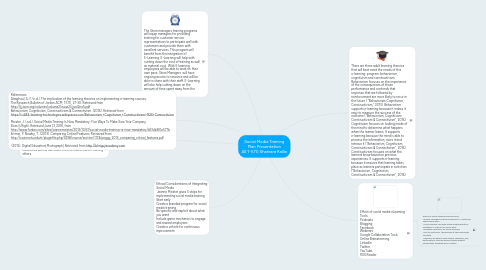Social Media Training Plan Presentation AET-570 Shamara Kallie
by Shamara Kallie

1. The Store managers training programs will equip managers for providing training for customer service representatives to participate well with customers and provide them with excellent services. This program will benefit from the integration of E-Learning. E-Learning will help with cutting down the cost of training as well as material cost. With E-learning employees will be able to work on their own pace. Store Managers will have ongoing access to resource and will be able to share with their staff. E-Learning will also help cutting down on the amount of time spent away from the store for training.
2. Ethical Considerations of Integrating Social Media Jeanne Meister gives 5 steps for implementing social media training Start early Create a branded program for social media training Be specific and explicit about what you want Include game mechanics to engage and reward employees Create a vehicle for continuous improvement
3. Relevant Training Program Competencies After completing the training each participant will be able to: Store Managers will be able to provide training to customers service representatives , teaching them how to effectively interact with customers and provide them with excellent services. Social media would provide the trainees to review the material as well as use share the information when training others.
4. References Alzaghoul, A. F. (n.d.). The implication of the learning theories on implementing e-learning courses. The Research Bulletin of Jordan ACM, 11(11), 27-30. Retrieved from http://ijj.acm.org/volumes/volume2/issue2/ijjvol2no5.pdf Behaviorism, Cognitivism, Constructivism & Connectivism. (2016). Retrieved from https://ci484-learning-technologies.wikispaces.com/Behaviorism,+Cognitivism,+Constructivism+%26+Connectivism Meister, J. (n.d.). Social Media Training Is Now Mandatory: Five Ways To Make Sure Your Company Does It Right. Retrieved June 13, 2016, from http://www.forbes.com/sites/jeannemeister/2012/10/31/social-media-training-is-now-mandatory/#31db3f0e577b Ertmer, P. Newby, T. (2013). Comparing Critical Features. Retrieved from http://ocw.metu.edu.tr/pluginfile.php/3298/course/section/1174/peggy_2013_comparing_critical_features.pdf (2015). Digital Education[Photograph].Retrieved from http://bhrigujiacademy.com
5. There are three adult learning theories that will best meet the needs of this e-learning program: behaviorism, cognitivism and constructivism. Behaviorism focuses on the importance of the consequences of those performance and contends that response that are followed by reinforcement are more likely to recur in the future ( “Behaviorism,Cognitivism, Constructivism,” 2013). Behaviorism supports e-learning because it makes it easy to measure the success of the outcome ("Behaviorism, Cognitivism, Constructivism & Connectivism", 2016). Cognitivism focuses on looking inside of the mind to determine what happens when the learner learns. It supports e-learning because the mind is able to process the information, store it and retrieve it ("Behaviorism, Cognitivism, Constructivism & Connectivism", 2016). Constructivism focuses on what the learners know based on previous experiences. It supports e-learning because it ensures that learning takes place as learners participate in activities ("Behaviorism, Cognitivism, Constructivism & Connectivism", 2016).
6. Effect of social media eLearning Tools: Podcasts Blogging Facebook Webinars Google Collaboration Tools Online Brainstorming LinkedIn Twitter YouTube. RSS Reader
6.1. Effect of social media eLearning Tools *Allows managers and the company to create and share information *The company can have virtual meeting with all managers or interact on social sites *Provides a platform for social learning *Use of electronic technology at the employees facilitate *Learners are able to view videos, webinars, and participate in internet based classes without leaving their assigned work location


